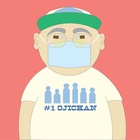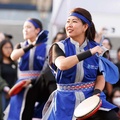Since the quarantine was declared in Peru, on March 16, 2020, due to Covid-19, the country has never been the same. Added to the high number of deaths and infections is the number of people who have lost their jobs, the businesses that have had to close and the consequent economic problems that this causes. The drastic changes have been accompanied by two words: crisis and reinvention.
Restaurants and other businesses related to Peruvian cuisine were prevented from serving their premises from one day to the next, so they adapted their services for home delivery or pick-up at the door of the premises, as authorized by the government. with a ministerial resolution, effective since May 4, following a biosafety protocol. In a second phase, which began on July 20, restaurant rooms were authorized to operate, but only with 40% capacity.
This whole situation motivated some Nikkei restaurants and brands to reinvent their service or adapt it, as is the case of the Chancho Panza restaurant, located in the Jesús María district and owned by César 'Chiky' Takuma, opened more than 10 years ago. He, along with his partner, Mirian Okumura, and their children decided to launch the business “ La tiendita nikkei ”, a family business selling instant ramen, onigiri and other Japanese and generic products at home.
“Since Chancho Panza couldn't open, we had to see how to generate income and since Mirian and my dad have always cooked great food, the idea of selling food and desserts arose,” says Andrea Takuma, adding that, after several tests, they have launched a new product: Japanese donuts, a mix of donuts with omochi , in various flavors (chocolate, matcha, oreo, lemon with coconut and coffee with nuts), which they will begin to sell under a new brand called DON' T.
“When we have a lot of orders, everyone in the house helps, even my oba,” says Andrea. The Nikkei store covers all of Metropolitan Lima and Callao, although they also make shipments to the provinces. “Ramen was our first product, but sometimes the gyozas (chicken and pork) are over-ordered. The majority of our clients are Nikkeis, but the 'Peruvian' clientele is increasing,” he adds.
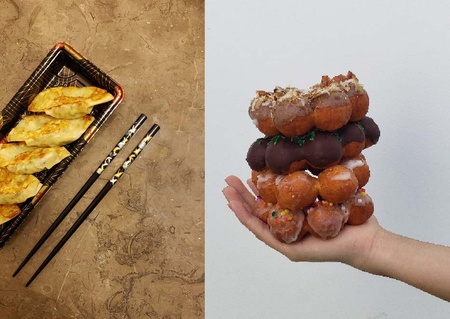
Makis in your home
In Peru, makis are the most popular in Nikkei cuisine. Many restaurants have begun to offer them at home with a series of measures that seek to give security and confidence to the customer. Senshi Sushi Bar, a Nikkei restaurant located in the Lince district, has developed an exemplary health protocol , as well as a website to receive orders comfortably. Itamae Pierre Suqueyama, owner of Senshi, says that they restarted work at the end of May with this service and that they had good results.
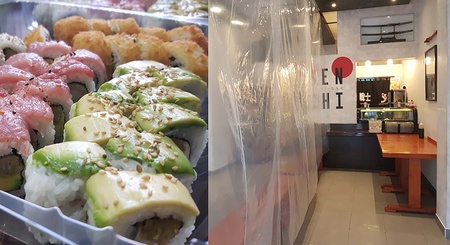
“We opened with fear and uncertainty since we have never had delivery and, the truth is, that day was crazy, we started with many orders, we did not expect to have so much reception.” The temporary closure caused them several problems regarding the payment of rent and payroll. “We adapted by complying with all the protocols, we started by dividing the premises in two, with an area where only staff and suppliers enter, and another where only products leave.”
They received training in health issues and the same staff was in charge of the motorcycle deliveries. “We take Covid-19 tests, we work with protective equipment and we disinfect the premises every day. We take care of the health of the team itself and the consumers. The main challenge is to stay healthy to guarantee health, since we live in difficult times, but we have to get ahead."
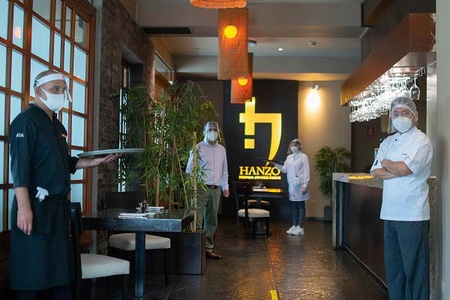
Cooking and technology
Hanzo is one of the most recognized Nikkei restaurants in the country, like everyone else, it came with the surprising news of the quarantine. Hitomi Shiroma, administrator of Hanzo, explains that in the first weeks they had large inventory losses. “Our production center and restaurants had supplies that we had to give away before they went bad. We had virtual meetings with staff to explain the situation and what they should do until the government lets us operate.”
Like many, they did not expect the quarantine to last so long. Luckily, he says, most landlords understood their situation and were flexible with the rent. Others, not so much, which is why they have had to move some premises. Part of the team began teleworking, with a new schedule and rhythm, new responsibilities were assigned, the menu had to be reduced and even a new virtual platform was created through which they could serve clients.
Coma.pe groups the restaurants Hanzo, Katsuya, Wasabi and Tom Davis, with three large delivery areas. “We created this virtual store to take advantage of the synergy of our four brands and we continue working to expand the brands to give more traffic to the store. In person, we open Hanzo de San Isidro and use a QR code so that customers can view the menu on their cell phones. At the time of payment, customers can use contactless cards to avoid risk as much as possible.”
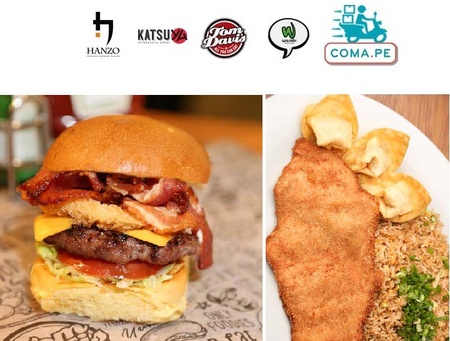
Reinvent and resist
Mitsuharu Tsumura is one of the most emblematic chefs of Peruvian Nikkei cuisine and, when he had to close the Maido restaurant, best restaurant in Latin America's 50 Best Restaurants 2019 and ranked tenth in the world edition of the same ranking. In June of this year, Tsumura created “ Micha en casa ”, a brand to offer dishes at home, with a more casual style than that of his prestigious restaurant, but with the same quality. Their menu includes nigiris , makis , ramen, various hot dishes and even desserts.
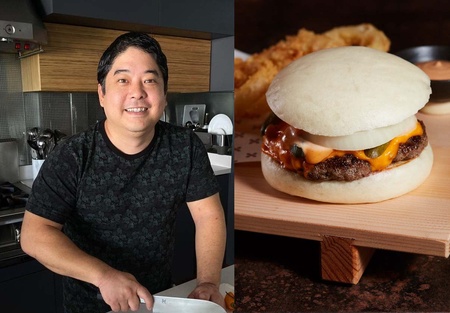
“Offer more affordable prices, with the aim of democratizing cooking,” says 'Micha', who, two months after the launch of this new brand, says that he prefers to take the days as they come, not project himself too much, although he would like to wear his dishes to the provinces. "Our goal now is to solve fixed costs, maintain the entire team, we have not suspended anyone and now the delivery channel is what helps us endure, but people's economic situation is difficult."
At the moment, he plans to open the Maido lounge in September, but he assures that as long as the virus is not controlled, nothing will be enough for the restaurants. “It is not about losing fear of the virus, people have to adapt to the new normal.” In that sense, some innovative initiatives can complement the limited capacity of premises, such as virtual restaurants or hidden kitchens, which can be formulas to help businesses emerge, little by little, from this crisis.
Reinventing yourself has become the new cliché, but Micha is clear: “it is a year to survive, not to make hasty investments.” Hitomi Shiroma, from Hanzo, says that changes are necessary and recommends reinforcing three points: flexibility, communication with the client and thinking outside the box. “Listen to customer suggestions, complaints and comments. It is necessary to open our mind to see possibilities to which we are not accustomed. Evaluate the resources you have and your strengths, just as the Issei did when they arrived in Peru without knowing anything. This combination could result in its differential value.”
© 2020 Javier García Wong-Kit


